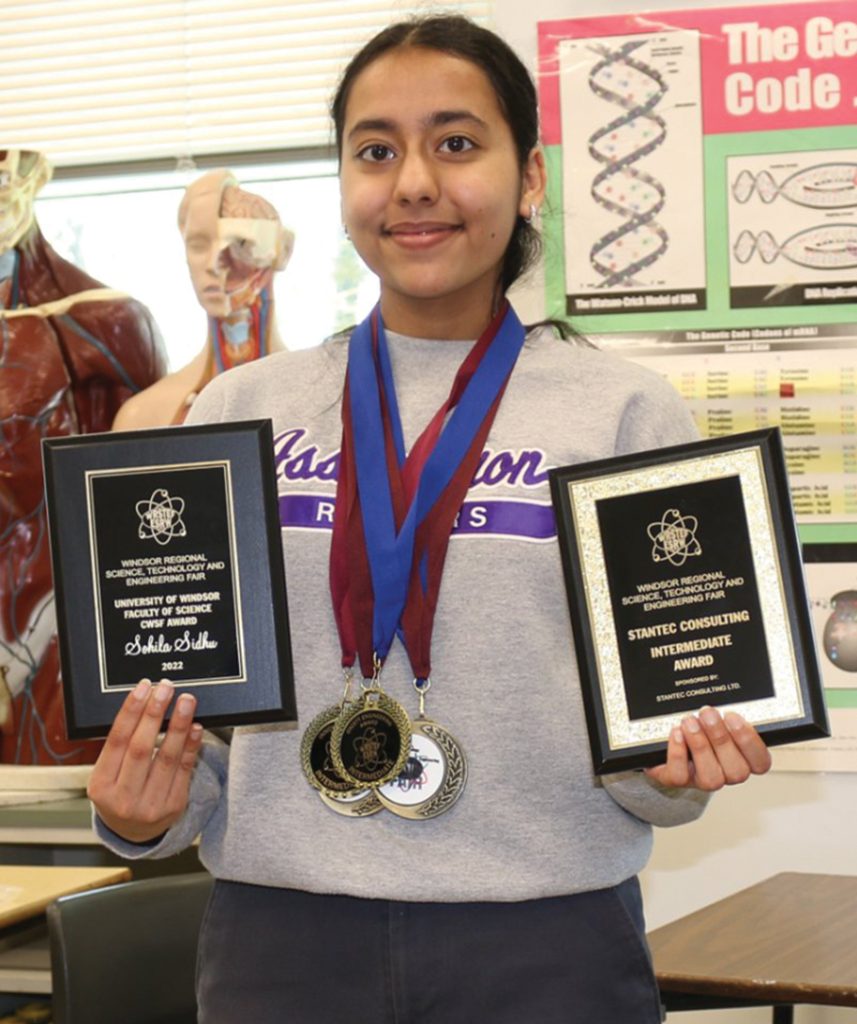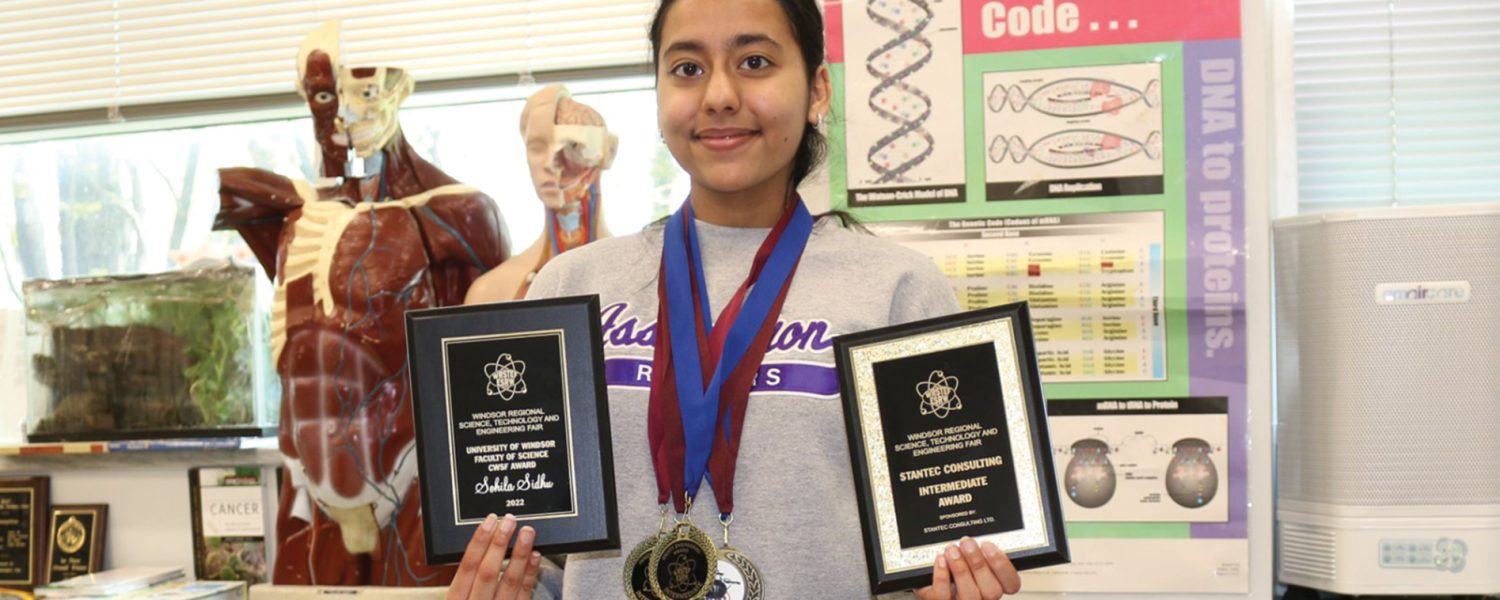Grade 10 Student Sohila Kaur Sidhu Aims
To Make Life Better For Those Living With Diabetes
Story by Alley L. Biniarz
Photography by Stephen Fields
For as long as she can remember, Sohila Kaur Sidhu wanted to become a doctor; her recent win at the Windsor Regional Science Technology and Engineering Fair for her artificial pancreas design just confirmed her passion and purpose in this field.
“Ever since I was a young child, I’ve always been fascinated with how things work. Everything around us can be explained by science,” Sohila says. “I’ve experimented with different fields of interest and I know that this is a pathway for me.”
As a grade 10 student at Assumption College Catholic High School, she learned about diabetes in her science class and was particularly struck by the WHO statistic shared with her class that over 1.5 million people are affected by the disease. Along with the classroom inspiration, Sohila was also motivated towards this project by her mom, who experienced gestational diabetes while pregnant with Sohila’s sister, along with her cousin and favourite teacher who were both recently diagnosed with diabetes. Watching so many around her touched by the disease encouraged Sohila to take action and make a difference in their lives.
“It surprised me that with so many people who live with the disease, and one that’s been around for so long, that it’s still such an issue that hasn’t been solved,” Sohila explains the initial inspiration for her science fair proof of concept. “It’s such a restrictive lifestyle: you have to prick your finger 3-4 times a day to check your blood glucose levels, and your schedule and ability to go out is dictated by your disease; it’s a difficult way to live.”

For her winning project, Sohila designed and tested an artificial pancreatic prototype. This pancreas would work in a real-life application where it senses high blood glucose and administers insulin as needed and then stops administering once it’s not required. The process is completely automatic and truly mimics a working pancreas which responds to increased glucose levels in the body.
Sohila also connected the sensor using a Bluetooth smartphone application, Ardutooth, to help users view their glucose levels immediately. “I wanted my project to be linked to a phone so if anything went wrong, the person could see what was going on in their bodies in real time right on their device. This could really help someone in a diabetic situation and improve patient care,” she adds.
A lot of research went into this project, which Sohila began working on in October of 2021 to prepare for the May science fair. Sohila had to juggle schoolwork and exams on top of wiring circuit boards, figuring out the physics behind the prototype, and coding the digital app. She is grateful to her mentors, Brent Charron and Ahmad Ali, both Canada-Wide Science Fair (CWSF) alumni and University of Windsor students for their guidance and for helping her with the coding portion of the project. Sohila has also been taking coding classes since the 7th grade and has a basic understanding of coding that she continues to advance.
“I believe that A.I. (Artificial Intelligence) and coding is going to take the field of medicine by storm. We already have robotic surgeries and virtual nursing assistance, and technology is constantly advancing and changing. I’m excited to see how far it can go in the future, especially when looking at the healthcare industry and innovative medicine; we’ve come so far and we can go so much further,” she says about the importance of introducing coding into her lifestyle in anticipation for a career in the medical field.
Sohila’s placement in the regional fair has also recently led her to the Canada-wide competition, which celebrates the best research projects from students across the country with a focus on health sciences, life sciences, and biotechnology. This year’s competition also took place in May during the 60th edition of Youth Science Canada’s (YSC) Canada-Wide Science Fair (CWSF) where 98 projects from the junior, intermediate and senior categories competed for the Sanofi Biogenius Canada awards. This Competition and Grant encourages students from coast-to-coast and with any background to break barriers and explore real-life science, technology, engineering, and mathematics (STEM) research that can change lives, all before leaving high school.
In this national fair, Sohila placed bronze in the Intermediate category, received a $1,000 scholarship to Western University, and was selected as a winner of the Sanofi Biogenius Canada Competition for her project. “The regional level was a little more laid back, whereas the Canada-wide competition was more nerve-wracking. I felt a lot of pressure because I’d won in regional, so I wanted to give my best at the Canada-wide competition as well. Overall it was a lot of fun and I was so excited to show what I’d done; winning and placing has made me feel like all of my hard work has paid off.”
Sohila says that it feels amazing to know that people throughout Windsor have been supporting her in this journey, and she hopes that one day in the future she could get this project ready for real-life application. For now she is basking in having won the science fair and feeling honoured to represent women in STEM.
“As a young female it feels amazing to know that after winning, now people can see and know that young people—especially young female entrepreneurs—have what it takes to take the future generations of science to the next level.”
Sohila wasn’t afraid to take on new challenges or learn new skill sets throughout her journey and she would like to encourage other students like herself to do the same, and to never give up in the face of adversity. “I had very limited knowledge about wires and circuits, but you need to persevere no matter how little you know about a topic. If you’re passionate about it, nothing should stop you from reaching your goal.”




Add comment